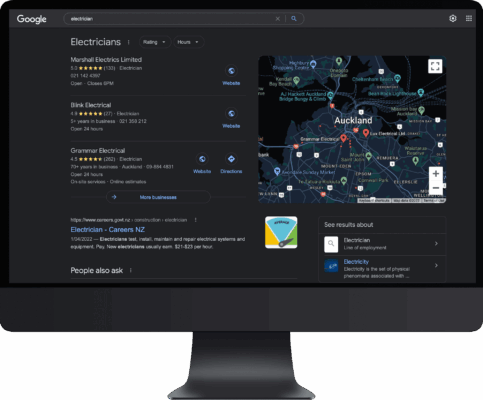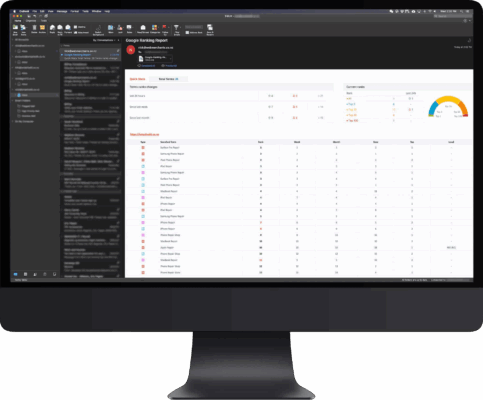Search Engine Ranking / SEO

Local SEO
Local search engine optimisation focuses on increasing online presence for businesses that serve their customers within a geographical area. These can be retail shops, hotels, doctors, dry cleaners etc with physical locations. It also incorporates service businesses that work on site like builders, electricians & cleaners.
Organic Search SEO
The technique uses industry best practises to improve the ranking on Google to, at a minimum, 1st page for keywords and phrases users are searching to find a specific product or service.


Tailored plans
SEO monthly packages are priced based on a clients requirements and are generally priced from $250pm – $1000pm and includes realtime performance reports.
Contact us for a tailored SEO proposal.
SEO FAQ
Organic SEO, or organic search engine optimization, refers to the process of optimizing a website and its content to improve its visibility on search engine results pages (SERPs) in a natural, unpaid, and non-advertising manner. The goal of organic SEO is to increase the website’s ranking for relevant keywords and phrases, making it more likely to appear among the top results when users search for information related to the site’s content.
Keyword Research: Identifying and targeting relevant keywords that potential visitors might use when searching for information related to your website.
On-Page Optimization: Optimizing various elements on the web pages, such as meta tags, headings, content, and images, to make them more search engine-friendly.
Quality Content: Creating high-quality, relevant, and engaging content that addresses the needs of the target audience. Content is a crucial factor for search engine rankings.
Link Building: Acquiring high-quality backlinks from reputable websites to improve the site’s authority and credibility. However, it’s important to focus on natural link-building practices to avoid penalties from search engines.
User Experience: Ensuring a positive and user-friendly experience on the website, including easy navigation, fast loading times, and mobile responsiveness. User experience is increasingly important in search engine algorithms.
Technical SEO: Optimizing technical aspects of the website, such as crawlability, site structure, and URL structure, to help search engines index and understand the content efficiently.
Local SEO: For businesses with a physical presence, optimizing for local search by claiming and optimizing Google My Business listings, obtaining local citations, and encouraging positive reviews.
Unlike paid advertising, organic SEO focuses on building a sustainable and long-term online presence. It requires ongoing effort and monitoring to adapt to changes in search engine algorithms and user behavior. While results may take time to manifest, the benefits of organic SEO often include increased visibility, credibility, and sustainable traffic growth.Certainly! In short, yes, engaging in Research and Development (R&D) is crucial for success in organic marketing. While Google provides a general framework of necessary steps, there are numerous advanced strategies tucked away in less-explored territories, demanding extensive research and experimentation to validate the efficacy of unconventional approaches. Continuous testing of ethical methods is imperative to stay abreast of the constantly evolving Google algorithms. Those who’ve been in the industry for an extended period often possess an advantage, as newer generations of marketers tend to embrace and adapt to innovative techniques, potentially overlooking the wealth of knowledge accumulated by their more experienced counterparts.
On-site SEO, also known as on-page SEO, refers to the optimization of various elements on a website to improve its visibility and relevance in search engine results pages (SERPs). Unlike off-site SEO, which focuses on external factors such as backlinks, on-site SEO deals with the content and structure of the website itself. The goal is to make the website more search engine-friendly and provide a better user experience. Key aspects of on-site SEO include:
- Keyword Optimization: Incorporating relevant keywords naturally into various elements of the webpage, including the title tag, meta description, header tags, and throughout the content. This helps search engines understand the topic and relevance of the page.
- Quality Content: Creating high-quality, valuable, and relevant content that addresses the needs of the target audience. Search engines prioritize content that provides useful information and a positive user experience.
- Meta Tags: Optimizing meta tags, including the title tag and meta description, to accurately represent the content of the page. These tags are displayed in search engine results and can significantly impact click-through rates.
- URL Structure: Creating clean and descriptive URLs that make it easy for both users and search engines to understand the content of the page.
- Header Tags: Using header tags (H1, H2, H3, etc.) to structure content and indicate the hierarchy of information on the page. This helps search engines understand the importance of different sections.
- Image Optimization: Optimizing images by using descriptive file names and alt attributes. This not only improves accessibility but also provides additional context for search engines.
- Internal Linking: Implementing a logical and user-friendly internal linking structure to connect related pages on the website. This helps distribute link equity and assists in the indexing of content.
- Mobile Responsiveness: Ensuring that the website is mobile-friendly and provides a positive experience for users on various devices, as mobile-friendliness is a significant factor in search engine rankings.
- Page Speed: Optimizing the loading speed of web pages, as faster-loading pages are favored by search engines and provide a better user experience.
On-site SEO is a fundamental component of a comprehensive SEO strategy. By addressing these on-site factors, websites can enhance their search engine visibility, improve rankings, and provide a better experience for users.
Off-site SEO, also known as off-page SEO, refers to the optimization activities that take place outside of the website itself to improve its visibility and authority on search engines. Unlike on-site SEO, which focuses on optimizing the website’s content and structure, off-site SEO involves strategies that aim to build the website’s reputation, credibility, and relevance in the broader online environment. Key aspects of off-site SEO include:
- Backlink Building: Acquiring high-quality and relevant backlinks from other reputable websites. Backlinks are considered votes of confidence and can positively impact a site’s search engine rankings.
- Social Media Marketing: Engaging in social media platforms to promote content, build brand awareness, and encourage social sharing. Social signals can indirectly influence search engine rankings.
- Online Reputation Management: Monitoring and managing the online reputation of a website or brand. Positive reviews and mentions across various platforms can contribute to a positive online image.
- Influencer Marketing: Collaborating with influencers or authoritative figures in the industry to promote content or products, thereby reaching a wider audience and gaining credibility.
- Local SEO: Optimizing for local search by claiming and optimizing Google My Business listings, obtaining local citations, and encouraging positive customer reviews.
- Content Marketing: Creating and promoting high-quality, shareable content that attracts natural backlinks and engages the target audience. This can include blog posts, articles, infographics, videos, and more.
- Guest Posting: Contributing valuable content to other websites in exchange for a backlink. This not only builds backlinks but also establishes the website as an authority in the industry.
- Brand Mentions: Getting mentioned or cited without a link on other reputable websites, forums, or social media platforms. Brand mentions contribute to the overall visibility and credibility of the website.
Off-site SEO is crucial for establishing the authority and trustworthiness of a website in the eyes of search engines. Search engines use off-site signals to evaluate the relevance and importance of a website within its broader online context. A well-rounded SEO strategy includes a combination of both on-site and off-site optimization efforts to achieve the best possible search engine rankings.
White hat SEO refers to ethical and legitimate strategies and techniques used to optimize a website’s visibility on search engine results pages (SERPs). These methods strictly adhere to search engine guidelines, and their primary focus is on providing value to users and improving the overall user experience. White hat SEO is considered the opposite of black hat SEO, which involves deceptive and manipulative tactics that can result in penalties or banning from search engines.
What are some White Hat practices?
Key principles and practices of white hat SEO include:
- Quality Content: Creating high-quality, relevant, and valuable content that meets the needs of the target audience. Content should be well-written, informative, and engaging.
- Keyword Optimization: Conducting thorough keyword research and incorporating relevant keywords naturally into the content, meta tags, and other on-page elements.
- Optimized Meta Tags: Writing accurate and compelling meta titles and meta descriptions that accurately reflect the content of the page.
- Quality Backlinks: Building high-quality and relevant backlinks from reputable websites through ethical methods. This may include outreach, content marketing, and networking within the industry.
- Responsive Design: Ensuring that the website is mobile-friendly and has a responsive design to provide a positive user experience on various devices.
- Site Structure and Navigation: Designing a clear and intuitive site structure with easy navigation to help users find information quickly and easily.
- Technical SEO: Optimizing technical aspects of the website, such as improving page load speed, fixing crawl errors, and implementing proper redirects.
- Social Media Integration: Leveraging social media platforms to promote content and engage with the audience, contributing to increased visibility and brand awareness.
- User Experience: Prioritizing user experience by focusing on factors such as page speed, mobile optimization, and overall website usability.
White hat SEO aims to build a website’s authority and credibility over time, resulting in sustainable and long-term success in search engine rankings. Adhering to ethical practices not only helps avoid potential penalties from search engines but also fosters a positive online reputation and trust among users.
Black hat SEO refers to unethical and manipulative techniques and strategies used to improve a website’s search engine rankings. These practices violate search engine guidelines and are designed to exploit weaknesses in algorithms, rather than providing valuable content and a positive user experience. While black hat SEO tactics may yield quick and seemingly significant results, they can lead to severe consequences, including penalties, removal from search engine indexes, and damage to the website’s reputation.
What are some Black Hat practices?
Common black hat SEO techniques include:
- Keyword Stuffing: Overloading web pages with excessive keywords in an attempt to manipulate search engine rankings.
- Cloaking: Showing different content to search engines and users, misleading search engines about the actual content of the page.
- Hidden Text and Links: Placing text or links that are not visible to users but are intended to be crawled by search engines.
- Doorway Pages: Creating low-quality, optimized pages designed to rank high in search results and redirect users to another page.
- Link Farming: Building or participating in networks of websites solely for the purpose of exchanging links to manipulate search engine rankings.
- Spamming: Engaging in comment spam, forum spam, or other forms of unsolicited online promotion to build links or increase visibility.
- Negative SEO: Deliberately harming a competitor’s website by engaging in black hat SEO tactics on their behalf.
- Content Automation: Generating low-quality content through automated means with the primary goal of manipulating search engine rankings.
Search engines, such as Google, continuously update their algorithms to detect and penalize websites employing black hat SEO tactics. As a result, the short-term gains achieved through these methods are often outweighed by long-term consequences. Website owners and marketers are strongly encouraged to focus on white hat SEO practices that prioritize user experience, quality content, and adherence to search engine guidelines for sustainable and ethical growth.
Yes, using black hat SEO techniques can have serious consequences, and you can face penalties from search engines. If search engines, such as Google, discover that your website is employing unethical and manipulative tactics to artificially boost its rankings, they may take various actions, including:
- Penalties: Search engines may penalize your website by lowering its ranking or even removing it from their index altogether.
- Loss of Rankings: Any gains achieved through black hat methods are likely to be short-lived. Once search engines identify the manipulation, your rankings can drop significantly.
- Deindexing: In severe cases, search engines may deindex your entire website, making it invisible in search results.
- Damage to Reputation: Engaging in black hat SEO can tarnish your website’s reputation, and users may lose trust in your brand.
- Legal Consequences: Some black hat techniques may involve legal violations, such as copyright infringement or fraud, which could lead to legal action against you.
It’s crucial to understand that search engines are continually evolving and improving their algorithms to detect and penalize manipulative practices. In the long run, using black hat SEO is not a sustainable or ethical approach to building an online presence. It’s recommended to focus on white hat SEO techniques, which prioritize providing valuable content, a positive user experience, and adherence to search engine guidelines. This approach not only helps your website rank higher but also ensures its long-term success and credibility.
Yes, RANK can potentially help you recover from a Google penalty. However, the effectiveness of the recovery process depends on various factors, including the nature and extent of the penalty, as well as the specific actions that led to the penalty. Here are some general methods that may be employed to recover from a Google penalty:
- Audit and Identify Issues: Conduct a thorough audit to identify the specific issues that led to the Google penalty. This may involve assessing on-page factors, backlink profiles, and other potential violations of Google’s guidelines.
- Remove or Disavow Harmful Links: If the penalty is related to unnatural or spammy backlinks, it’s essential to identify and remove or disavow those links. This process helps demonstrate to Google that you are taking corrective actions.
- Content Cleanup: If the penalty is associated with low-quality or duplicate content, improve the quality of your content. Remove or rewrite content that may be considered thin or non-original.
- Technical SEO Fixes: Address technical issues on your website, such as fixing crawl errors, improving site speed, and ensuring proper indexing.
- Reconsideration Request: Submit a reconsideration request to Google, outlining the steps you have taken to rectify the issues. Be transparent about the changes made and provide evidence of your commitment to adhering to Google’s guidelines.
- Content Marketing and Quality Improvement: Focus on creating high-quality, valuable content that aligns with user intent. Implement content marketing strategies to enhance the overall user experience on your site.
- Social Media Engagement: Increase your presence on social media platforms to improve brand visibility and engagement, which can positively impact your online reputation.
- Monitor and Adapt: Continuously monitor your website’s performance, stay informed about changes in search engine algorithms, and adapt your strategies accordingly to maintain compliance with best practices.
It’s important to note that the recovery process can take time, and there are no guaranteed outcomes. Additionally, seeking professional assistance, such as from RANK or other SEO experts, may be beneficial in navigating the complexities of Google penalties and implementing effective recovery strategies.

Get A Search Engine Ranking Strategy Proposal.